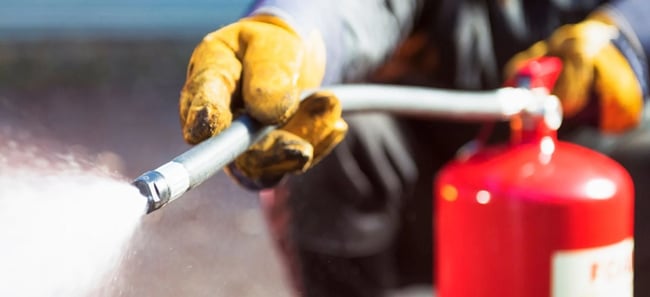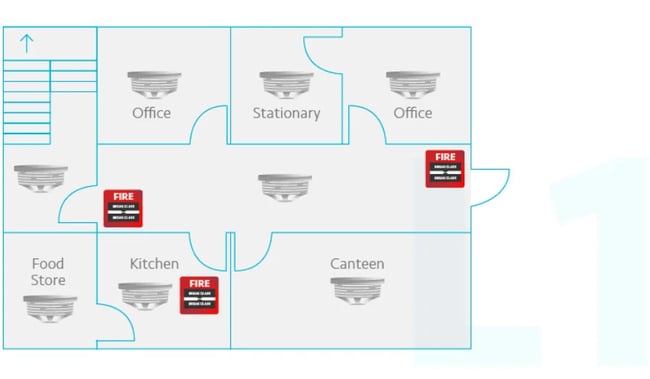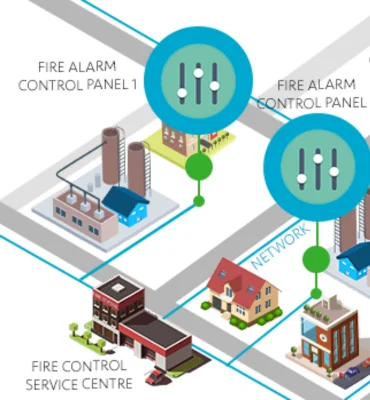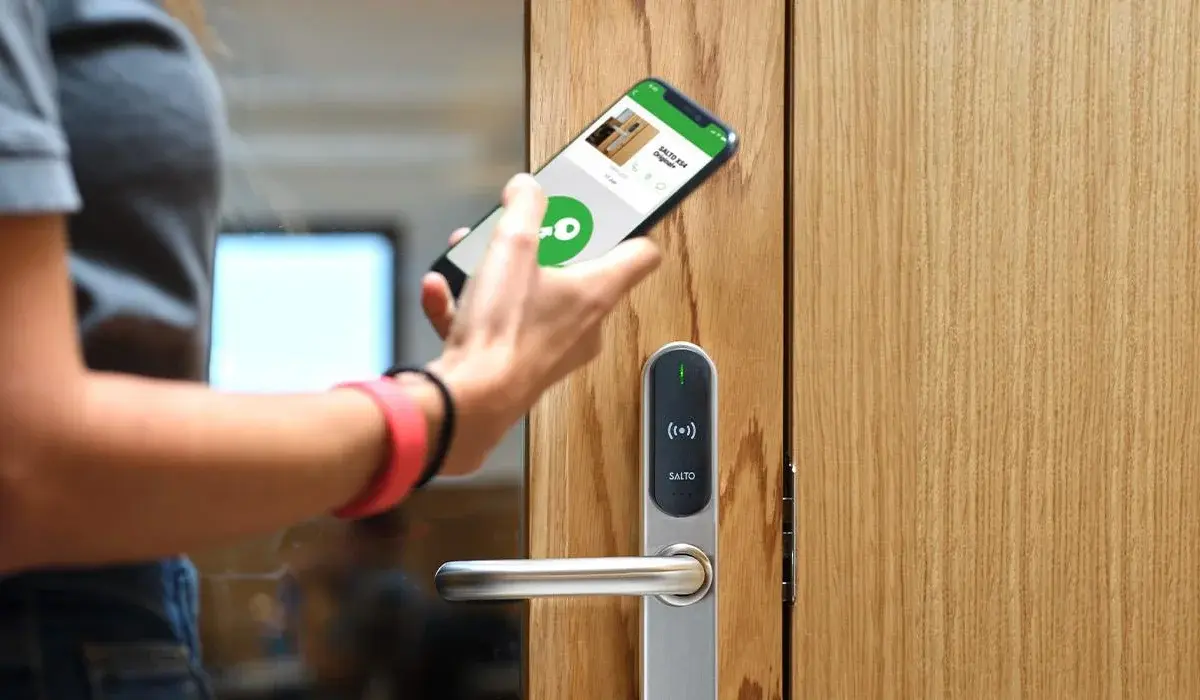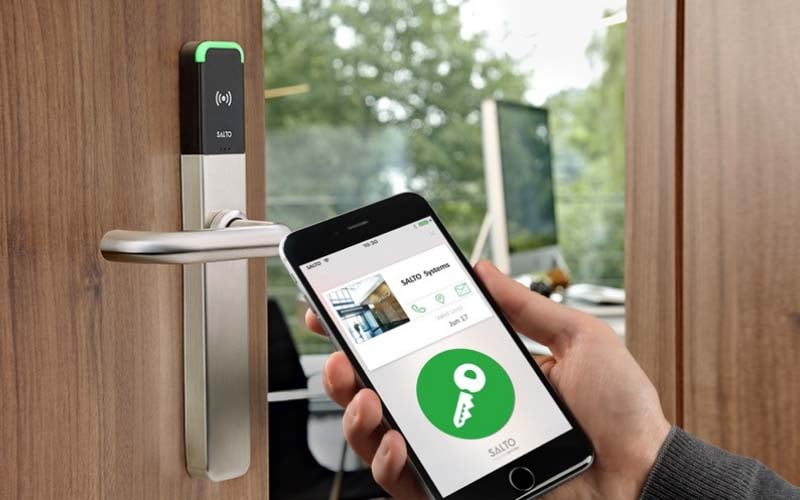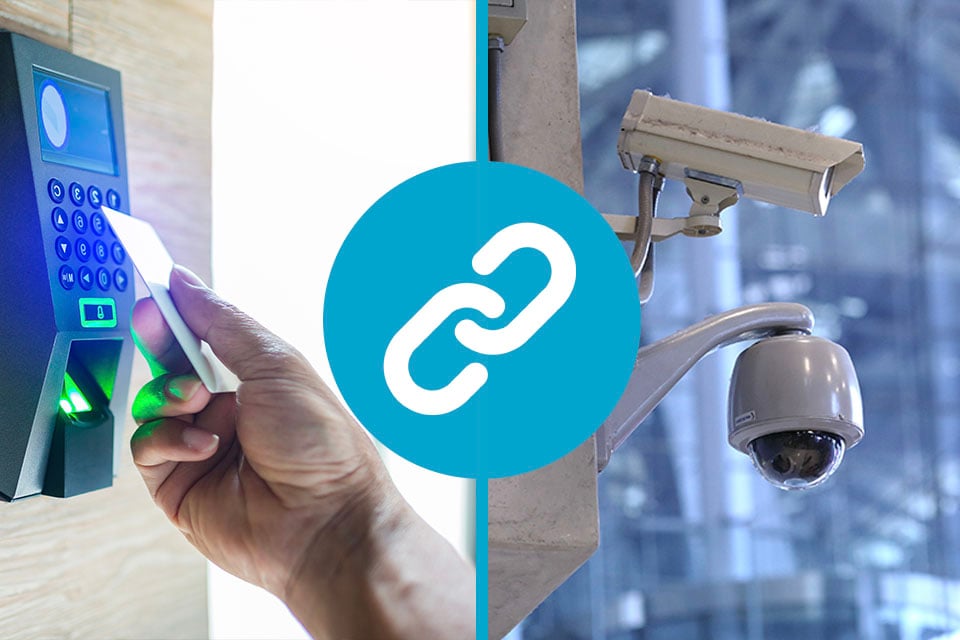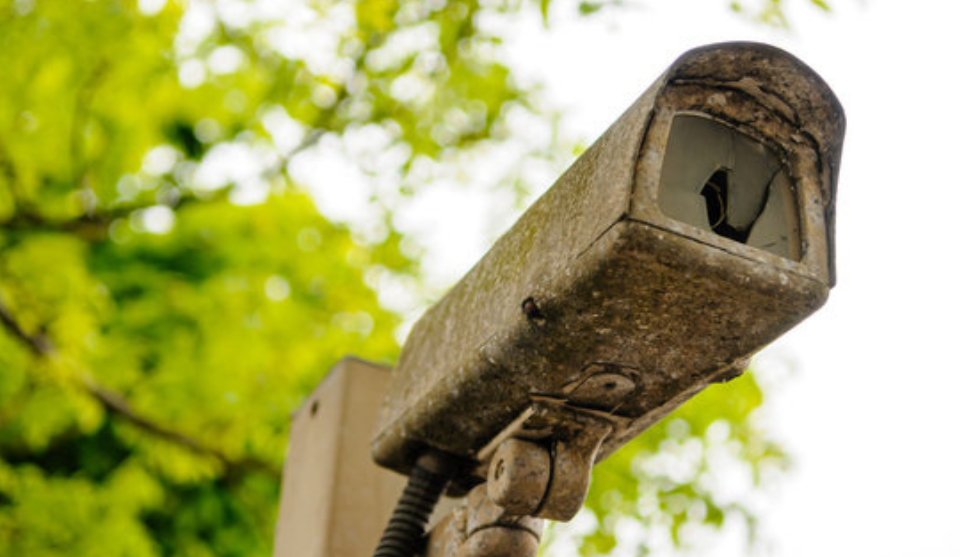Fire brigade callouts rose by over 11% last year, to the highest number in a decade, with UK Fire Services called out over 700,000 times. It seems like - after a fall during the pandemic - building fires may again be on the rise. Ensuring your site, whether residential, commercial or education, is protected against the devastation a fire can cause is more important than ever.
Jump To
- What Is Remote Fire Alarm Monitoring?
- How Does Fire Alarm Monitoring Work?
- What Are the Benefits of a Monitored Fire Alarm?
- How Much Does Third Party Fire Alarm Monitoring Cost?
- Final Thoughts
Smart fire alarms and air sampling systems like VESDA are a great start for detecting fires as early as possible. When combined with fire suppression systems, these technologies can eliminate the fire risk automatically.
However, even these systems can have flaws, and some fires will require intervention by the fire service. While your site is occupied, those inside can call 999, but what if no one is there? What is the failsafe that will make the difference between a small fire that is caught and extinguished quickly, and one which burns out of control, destroying your building and its contents? The solution is a monitored fire alarm.
In this blog we explain what fire alarm monitoring services are, how they work, and the benefits of fire alarm monitoring, including a faster emergency response.

What Is Remote Fire Alarm Monitoring?
Fire alarm monitoring involves having the signal from your fire alarm system sent to an Alarm Receiving Centre, or ARC.
The off-site receiving centre will be monitoring multiple fire alarm systems, and when a signal is triggered, the team responds accordingly. This removes the need for you to do anything, whether you’re in the building or not.
The responsibility for contacting the fire brigade is taken off your shoulders, and a monitored alarm grants you additional peace of mind by removing the risk of no-one hearing the sirens when the building is empty, allowing the fire to spread unchecked. In either situation, the result is faster response times and less damage to your property.
.webp?width=960&height=440&name=CL%20in%20article%20(1).webp)
How Does Fire Alarm Monitoring Work?
When one of your fire detection devices identifies the signs of a fire, it will trigger the alarm. Your control panel will then send a signal to the ARC, alerting them. Depending on whether your site is occupied or not, the ARC team will take two different approaches.
If you are there, they will contact you first to verify the fire, before calling the fire brigade. If your site is unoccupied, the ARC team will call the fire brigade directly, before informing you of the fire.
.webp?width=960&height=440&name=CL%20in%20article%20(2).webp)
What Are the Benefits of a Monitored Fire Alarm?
Speed & Quality of Emergency Service Response
With the fire brigade becoming increasingly stretched due to lack of funding, average response times have increased by almost a minute over the last decade. This makes it crucial that the emergency services receive the exact information they need, delivered as concisely as possible.
The team at the fire alarm monitoring companies are given specific training in how to contact the emergency services and provide them with all the details necessary for an effective fire brigade response. If you have an addressable fire alarm system, they will also be able to inform the fire brigade exactly where the fire is located. Plus, when almost 40% of fires attended by the emergency services are false alarms, the ARC team’s experience gives priority to the call. This ensures that you will receive a swift call out, even at the busiest times.
%20(1).webp?width=960&height=440&name=CL%20in%20article%20(1)%20(1).webp)
Fewer False Alarms
While false alarms account for 38% of all fires attended by the fire brigade, in 2022 they made up 98% of all automatic fire alarm incidents. It has become such a problem that the London Fire Brigade issues fines to businesses that have more than 10 false alarms over a 12 month period.
6% of false alarms from automatic systems were a result of “good intent” (that is, the fire alarm was activated in the belief that there was a fire, but there wasn’t). Another 2% were malicious false alarms. The remaining 90% were caused by faulty equipment. That means 16.4% of all callouts result from faulty automatic alarms, even though automatic fire alarms are responsible for only 18.3% of the callouts attended by the fire service. This is a huge problem, and a massive drain on the time of fire and rescue service workers who could be attending actual fires.
By comparison, ARC staff will always verify an alarm before they call 999. While the site is occupied they would do this by calling up and asking anyone present to check. At night, they may check by other means:
- Video Verification - If you also have a CCTV system that is managed by a monitoring centre, their staff can access the live feeds to investigate if there is a fire, or another emergency taking place.
- Cross-Verification - If only one sensor is activating, but the others in the room or zone are inactive, this could be a sign of a faulty device. However, it is also possible that the other sensors are producing false negatives, and this would need to be investigated further.
- Time Delay Verification - In some cases, ARC staff may introduce a time delay before dispatching emergency services. They will continue to monitor the situation for a brief period, and if there is no additional confirmation of a fire, it may indicate a false alarm.
- System Diagnostics - ARC staff can check the fire alarm system's diagnostics and logs to see if there have been recurring issues or false alarms from specific devices. This can help identify potential system problems.
- Bypassing Zones - In certain circumstances, ARC staff can bypass specific zones or sensors to see if the alarm condition remains. If, for example, a particular sensor consistently triggers false alarms, it may be bypassed temporarily to prevent further false activations.
If your alarm is found to be faulty, the alarm system monitoring service can reset the system remotely and schedule a technician callout to perform any repairs necessary.
%20(1).webp?width=960&height=440&name=CL%20in%20article%20(2)%20(1).webp)
Reduced Buildings Insurance & Contents Insurance Premiums
Many insurance companies will offer lower premiums for property and contents insurance if you have a professionally monitored fire alarm. This is because if your protection is more comprehensive, the risk of having to pay out reduces. This reduction in premiums will more than offset your alarm system monitoring costs.
Peace of Mind
With an ARC monitoring your fire alarm system remotely, it is no longer your responsibility to contact the fire services in a fire, whether you’re in the building at the time or not. A faster and more effective response is guaranteed, and there is no longer any concern that an alarm will go unnoticed if the building is unoccupied.
The 24/7, 365 days a year monitoring also ensures that system faults or broken communication lines are detected immediately. If either of these occurs, the ARC will contact the keyholder to have the issue remedied, ensuring your system’s downtime is minimised, and your site’s protection is maintained.
.webp?width=960&height=440&name=CL%20in%20article%20(3).webp)
How Much Does Third Party Fire Alarm Monitoring Cost?
This will depend on the type of monitoring you opt for, but – as a ballpark figure – a single path system polling every 60 minutes will cost around £200 per year. For a greater level of protection, a dual path system polling every 4 minutes will be around £450 per year.
In the grand scheme of things, this is minimal when it comes to providing you peace of mind and reducing the risk of damage to your property. Additionally, the savings you will make on insurance premiums will offset, if not entirely eliminate the monitoring cost.
Final Thoughts
The argument for fire alarm monitoring is comprehensive. Your alarm will be monitored 24/7 by a professional team, improving the speed and quality of the response, reducing false alarms, and offering you peace of mind. The next step is choosing the right monitoring partner. We always recommend looking for the latest qualifications and certifications, so you can be sure the provider will offer you the best service possible.
At Chris Lewis Group, we’ve seen the devastating impact of fires first-hand. We understand the importance and value of remote fire alarm monitoring when it comes to protecting your property. Our BAFE & NSI-accredited monitoring team is fully experienced in emergency response protocol. We know how to keep your business safe so you don’t have to. No matter whether you’re inside or on-the-go, our expert fire and security team ensures your business is always in safe hands.

Luke Lewis-Rippington
Related Posts
The Types of Fire Extinguisher and How to Use Them
Fire extinguishers are a crucial piece of fire safety equipment. They can be the difference between a small fire that is nipped in the bud, and one that quickly spreads out of control, causing huge.
Everything You Need to Know About Fire Alarm Systems, Explained
There’s lots to consider when looking to install or upgrade a fire alarm system. In order to make things a little easier, and to simplify the information that’s out there, in this blog we talk about.
An Expert's Guide to Intruder Alarm Monitoring and Security Response
Last year set a new record for burglaries in the UK. 407,189 cases were reported during 2022 - a sharp 7% increase on the previous year. Despite year-on-year spikes, only 68% of businesses are.

